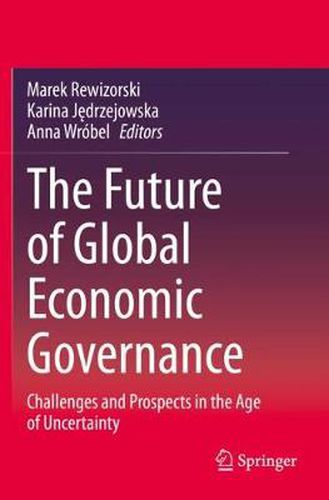Readings Newsletter
Become a Readings Member to make your shopping experience even easier.
Sign in or sign up for free!
You’re not far away from qualifying for FREE standard shipping within Australia
You’ve qualified for FREE standard shipping within Australia
The cart is loading…






This title is printed to order. This book may have been self-published. If so, we cannot guarantee the quality of the content. In the main most books will have gone through the editing process however some may not. We therefore suggest that you be aware of this before ordering this book. If in doubt check either the author or publisher’s details as we are unable to accept any returns unless they are faulty. Please contact us if you have any questions.
In light of new global challenges for international cooperation and coordination, such as the revival of protectionism, surge of populism, or energy-related issues, this volume highlights possible scenarios for the future of Global Economic Governance (GEG). The contributing authors analyze the substance of GEG as a normative framework for resolving collective action issues and promoting cross-border co-ordination and co-operation in the provision or exchange of goods, money, services and technical expertise in the world economy. Furthermore, the book examines drivers of fundamental shifts in global economic steering and covers topics such as power and authority shifts in the global governance architecture, technological and energy-related challenges, and the role of the G20 and BRICS in shaping global economic governance.
This book provides a very timely and nuanced account of the challenges facing the established global order.
Andrew F. Cooper (Professor of Political Science at the University of Waterloo)
This valuable collection from a new generation of innovative scholars of global economic governance offers insights from a broad range of theoretical approaches to the central policy issues of the day
John Kirton (Director of the Global Governance Program, Munk School of Global Affairs, University of Toronto)
$9.00 standard shipping within Australia
FREE standard shipping within Australia for orders over $100.00
Express & International shipping calculated at checkout
This title is printed to order. This book may have been self-published. If so, we cannot guarantee the quality of the content. In the main most books will have gone through the editing process however some may not. We therefore suggest that you be aware of this before ordering this book. If in doubt check either the author or publisher’s details as we are unable to accept any returns unless they are faulty. Please contact us if you have any questions.
In light of new global challenges for international cooperation and coordination, such as the revival of protectionism, surge of populism, or energy-related issues, this volume highlights possible scenarios for the future of Global Economic Governance (GEG). The contributing authors analyze the substance of GEG as a normative framework for resolving collective action issues and promoting cross-border co-ordination and co-operation in the provision or exchange of goods, money, services and technical expertise in the world economy. Furthermore, the book examines drivers of fundamental shifts in global economic steering and covers topics such as power and authority shifts in the global governance architecture, technological and energy-related challenges, and the role of the G20 and BRICS in shaping global economic governance.
This book provides a very timely and nuanced account of the challenges facing the established global order.
Andrew F. Cooper (Professor of Political Science at the University of Waterloo)
This valuable collection from a new generation of innovative scholars of global economic governance offers insights from a broad range of theoretical approaches to the central policy issues of the day
John Kirton (Director of the Global Governance Program, Munk School of Global Affairs, University of Toronto)